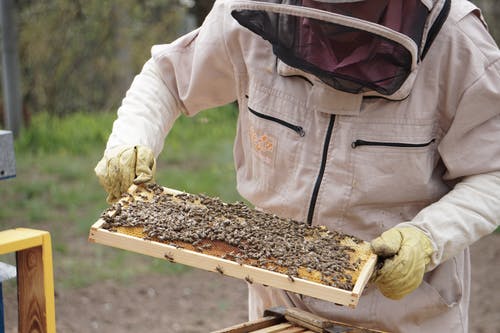It is understandable that most people don’t realize the basics of Beekeeping. It is not something that is taught at school. And even though people know that Honey comes from bees and that a person is involved in the process of collecting honey. The basics of Beekeeping is still some what of a mystery to the majority of consumers.
For many Beekeepers, learning the basics was a scary journey. Because lets be honest, bees are insects that can hurt. Not to mention some people have deadly allergies to bee stings. What you may or may not know is that some people only develop allergies to bee stings after they have been beekeeping for some time.
I cannot tell you how many times I’ve been stung. Mostly on my hands, since using gloves while beekeeping is not very productive. Especially in the hot months. Having a bulky bee suit on while the sun is beating down on you is not very comfortable, so you need to be in and out as fast as you possibly can. Getting stung is just a part of being a beekeeper.
Also know as Apiculture
Beekeeping, also known as apiculture, is the practice of maintaining and managing honey bee colonies for the purpose of harvesting honey, beeswax, and other byproducts. The history of beekeeping can be traced back to ancient civilizations, with evidence of beekeeping in Egypt and Greece dating back to 2400 BCE.
The very first thing you need to do to start beekeeping, is to get some bees. This can be done by purchasing a package of bees from a beekeeping supplier, or by catching a wild swarm of bees (a bit more advance option). Once the bees are obtained, a suitable home, known as a hive, must be provided for them. There are several types of hives that are commonly used in beekeeping, including Langstroth hives and top bar hives.
Regular maintenance and monitoring of the hive is crucial to the health and success of the bee colony. This includes tasks such as checking for disease and pests, providing an adequate food supply, and managing the hive’s population. Additionally, beekeepers must also keep an eye out for signs of swarming, and take necessary steps to prevent it from occurring. Harvesting honey is done by carefully removing the honeycomb from the hive, with the honey being extracted through a process of centrifugation.
The important Bee
The importance of bees to human societies cannot be overstated, as they play a crucial role in pollinating crops and supporting our food supply. However, bees populations are currently in decline due to factors such as habitat loss, pesticide use, and disease. It’s important for beekeepers, farmers, and citizens alike to take steps to protect and support bee populations, in order to ensure the continuation of this vital ecosystem service.

